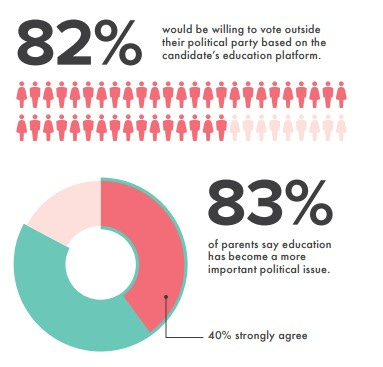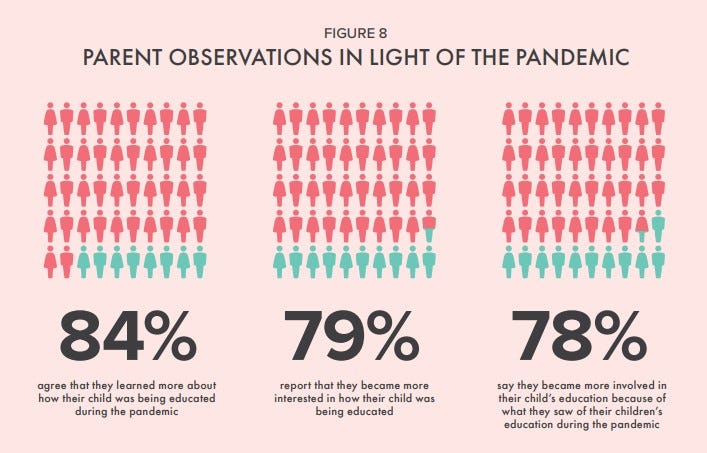Report solidifies parents as new swing voters
National Association of Public Charter Schools: four in five parents (83%) agree that education has become a more important political issue to them
A new report analyzing a poll on education from the National Association of Public Charter Schools (NAPCS) solidifies parents as a strong new category of swing voters.
The report is titled “Never Going Back: An Analysis of Parent Sentiment on Education.”
According to the report, “More than four in five parents (83%) agree that education has become a more important political issue to them than it was in the past,” and a whopping 82% are “willing to vote outside their party on the issue of education.”
Image from the NAPCS report “Never Going Back: An Analysis of Parent Sentiment on Education.”
The report looks at a Harris Poll survey conducted of 5,002 parents or legal guardians of a child or children enrolled in grades PreKindergarten through 12th grade at the end of the 2021-22 school year. The survey was conducted between May 19th and May 31st, 2022.
"This report tells us parents want and deserve options for their children's schooling, and they're willing to vote across party lines to get it,” Lindalyn Kakadelis, Executive Director of the NC Coalition for Charter Schools, said in a statement, “Public charter schools remain wildly popular as a free, public alternative to traditional zoned schools that are open to everybody."
Executive Director of the NC Association for Public Charter Schools Rhonda Dillingham also issued a statement on the report.
“In a time when Americans are divided on many issues, this report confirms the one thing we can all agree on: parents deserve a voice in their children’s education,” Dillingham said. “What’s more, they are willing to use their influence at the ballot box to make their voices heard, so much so that they are willing to vote outside their party when it comes to issues that affect their children.”
Other key takeaways from the NAPCS release include:
Parents value choice—93% agree one size doesn’t fit all in education. More than one in four parents are school-type switchers and 86% of all parents we surveyed want options for their children other than the district school they are zoned for or assigned to attend.
Charter schools are a popular choice among parents who switched the type of school their children attend.
Safety is a number one priority.
Parents who switched school types are happy with the choices they made. Eighty-nine percent of parents whose children made a switch report that they or their child experienced a positive change as a result.
Support for charter schools is high. Three in four parents want more public charter school offerings in their area.
Looking deeper into the report, the pandemic appears to have been a wake-up call.
A staggering 84% of parents agreed they learned more about how their child was being educated during the pandemic and 78% said they were now more engaged because of what they saw.
Image from the NAPCS report “Never Going Back: An Analysis of Parent Sentiment on Education.”
According to the report, an overwhelming percentage of the parent respondents want more choices and an even higher percentage are in favor of expanding the number of slots in existing public charter schools. Additionally, 74% agreed that if a public charter school were available in their area, they would send their child there.
Image from the NAPCS report “Never Going Back: An Analysis of Parent Sentiment on Education.”
The conclusion includes a damning look at how unsatisfied parents are with the quality of public school education.
“Currently, only 35% of parents are highly satisfied with the quality of their children’s education in public district schools, compared to 74% whose children who attend private schools and 72% who are homeschooling their children,” NAPCS’ conclusion states.
The level of dissatisfaction is higher for Black and Hispanic parents. The report breaks that down accordingly:
71% of Black parents strongly agree that one size does not fit all when it comes to educating children.
70% of Black parents and 63% of Hispanic parents strongly agree that parents should be able to have a choice in where their children go to school.
60% of Black parents and 54% of Hispanic parents strongly agree that they think having more than one type of public school option is a good thing.
53% of Black parents and 40% of Hispanic parents strongly agree that they want options for their children other than the district school they are zoned for or assigned.
Keep reading with a 7-day free trial
Subscribe to More to the Story by A.P. Dillon to keep reading this post and get 7 days of free access to the full post archives.




